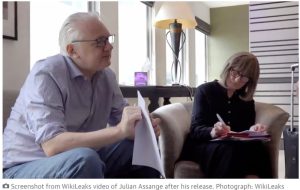Syria: the first step to ending the war is stopping western intervention
- 17 June 2013
- Samir Dathi
- Syria
If there is to be hope for the Syrian people, the first step is for all foreign interference to cease. Only then can Syrians renew the task of taking possession of their own country.
Syria: the first step to ending the war is stopping western intervention
- 17 June 2013
- Samir Dathi
- Syria
If there is to be hope for the Syrian people, the first step is for all foreign interference to cease. Only then can Syrians renew the task of taking possession of their own country.

By Samir Dathi
Stop the War Coalition
17 June 2013
Syria: Is there a moral case for western intervention? Stop the War’s John Rees debates with Anas Nader from Friends of Syria.
The war in Syria is at a critical juncture. Last Thursday, America announced for the first time that it would be providing military support to the opposition.
This follows claims from the American administration that it has intelligence proving that Assad has used chemical weapons, thus crossing Obama’s so called ‘red line’.
One wonders whether this is the same kind of ‘intelligence’ we were asked to believe in the lead up to the catastrophic war in Iraq
On the overcast and rainy Saturday following this announcement, over 150 protestors assembled outside the US Embassy in Grosvenor Square for a Stop the War Coalition demonstration to oppose the increasing Western interference in Syria. Chanting quickly began: ‘No justice, no peace – Hands off the Middle-East!’ and ‘Don’t arm Syria – Stop the spread of war!’
Then followed words from, amongst others, the convenor of Stop the War Lindsey German, Iraqi dissident and sociologist Sami Ramadani, and Labour member of the London Assembly, Murad Qureshi.
Of course Britain and France, the two great colonisers of the Middle East, have wanted to pour more arms into the Syrian bloodbath long before the US’s recent announcement. Indeed, last month they pushed through the lifting of the EU weapons embargo despite the opposition of the 25 other EU countries. The embargo will come to an end in August. Whilst Cameron has said he has no immediate plans to send arms into Syria, the logic of mission creep suggests that time could be fast approaching.
Earlier this month the US sent into Jordan a detachment of F-16s, a battery of Patriot missiles and 5,000 US personnel ostensibly to participate in a routine military exercise. Yet there have been speculations, including from the Russian foreign minister, Sergei Lavrov, that this might be a precursor to a no fly-zone over Syria. America has said that it will keep the jets and missiles in Jordan even after the military exercise is complete, much to Russia’s anger. The US already has Patriot missiles based in Syria’s northern neighbour, Turkey.
The increasing belligerence of the West towards Syria no doubt has everything to do with the military advances Assad has made in recent weeks. For example, earlier this month, Assad, with the help of Hezbollah, defeated the rebels at Qusair, a city of huge strategic importance. The US and its allies know full well that they cannot enter the Geneva peace talks next month from a position of weakness.
As Shamus Cooke says ‘In war, the purpose of peace negotiations is to copy the situation on the battlefield and paste it to a treaty: the army winning the war enters negotiations from a dominant position, since its position is enforceable on the ground.’ Given that the US-backed rebels continue to suffer defeat after defeat, peace talks would end the war on terms dictated by Assad. It is no wonder that much of the opposition refuse to participate in Geneva.
In Britain, the opposition to military intervention in Syria is strident. A recent poll shows that only 24% of British people support arming the opposition, an incoherent hodgepodge of sects and militias, increasingly dominated by Islamist elements and responsible for numerous massacres and atrocities. The recent UN Inquiry of Commission on Syria, conducted by Carla del Ponte and others, has confirmed that both sides have committed war crimes.
But it is not only the British people that oppose arming the rebels. Last Sunday, Nick Clegg said on the Andrew Marr Show that he did not want to get embroiled in a military conflict in Syria and that such a move would not be tolerable to the British people. He went on to say "This is a bloody civil war prosecuted by a brutal dictator, Assad, and the idea that we can provide a unilateral British solution to this is fanciful."
Lib-Dem Chief Secretary to the Treasury Danny Alexander said the case was "not proven yet" that arming the rebels would make any difference and former Lib-Dem leader Lord Ashdown said it would be "an act of very considerable folly" to do so. Cameron also faces opposition within his own party. Recently 80 Tories put their names to a letter to the Prime Minister in which they voice their concerns about being pulled into a Syrian conflict and demand a vote in the Commons on the issue. It is even believed that there is dissent within the Cabinet. Cameron would face quite a fight in getting any vote through Parliament.
Last Sunday, Russian president Vladimir Putin met David Cameron at Downing Street ahead of the G8 summit in Northern Ireland. At the press conference Cameron claimed that despite their differences, both he and Putin shared a common goal of ending the conflict in Syria. The truth of course is that both leaders are quite willing for the conflict to continue in perpetuity until it can be resolved on terms favourable to themselves, even if that means the death of another 100,000 Syrians.
Whilst many of us want nothing more than to see the ruthless dictator Assad go, we cannot support the further militarisation of the conflict, which will only perpetuate the horrific violence and refugee crisis in the region. If there is to be hope for the Syrian people, the first step is for all foreign interference to cease. Only then can Syrians renew the task of taking possession of their own country. And however difficult that task would be to achieve, it will certainly never happen whilst foreign powers continue to play the Great Game amidst the rubble and ash. It is therefore incumbent on British anti-war activists to continue to put pressure on our own government to end its cruel and cynical policy in Syria.

Recent Posts

HUNDREDS KILLED AND INJURED IN GAZA TENT CAMP BY ISRAELI AIR STRIKES




